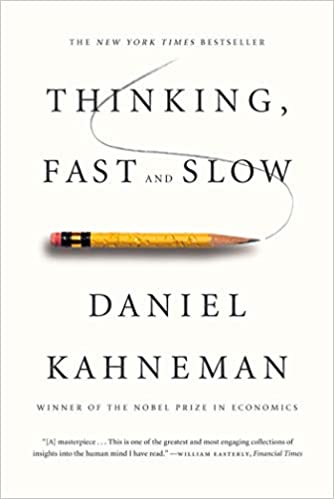Daniel Kahneman – Thinking, Fast and Slow Audiobook
Daniel Kahneman – Thinking, Fast and Slow Audiobook

Thinking, Fast and Slow Audiobook
It was difficult, but it was an important publication. Some reviewers still believe it is valuable in helping to change our mental habits. This is a mistake. It is not a good idea. book It is also very complicated. Kahneman Ends guide by stating that he has not been in a position to stop the instinctive impulses. He mentions the value of guide as giving people the vocabulary to spot biases. and not to criticize the choices made by others. (pp. 417-8) I was the one who ended up being book It was also available a few days prior and I found it very useful in degrading the works op-Columnists in ed. Thinking, Fast and Slow Audiobook Free. They are notorious for question replacement, which is when they replace an easily answered inquiry with one that is nearly impossible. The expert will answer the question “What does the current election of a certain leader in politics mean for Democrats?”. and Then, state that Democrats must run prospects with this type of individuality profile. Kahneman He isn’t as open to decision-makers as he is with those who may offer useful criticism to them. He does not think as much about individuals as he does about companies. He wants to create environments that have better results and better decision-making. You can assess his work by taking some of his ideas with you and assessing if they are applicable to your neighborhood. Are they a benefit to your community’s decision-making process? As many others have noted, although the publication is quite dense, it is vital for all levels of decision-making, from individual to public law. The intro is important, even if you don’t have the patience to go through all phases. and Last thought. But, the TL; DR is not sufficient. 1) People are not rational agents. However, they have complex interactions of thought and automated thinking that can either be correct or wrong. 2) Maximizing happiness requires us to recognize when we are in a cognitive minefield. and Feedback 3) Taking full advantage of joy can be difficult. It is the complicated interplay between recalled and seasoned happiness. This publication is still one of the top 10 most important in my life. Highly recommended in conjunction with Haidt’s “Righteous Mind”, these two books are extremely complementary. books Develop a multidimensional mirror to reflect the human condition. Only by seeing ourselves as we * are * can we deal with the business of controling ourselves and Our globe. Daniel KahnemanPrinceton University psychotherapist, Dr. Jeremy Sullivan, won the Nobel Prize in Business economics for his services.-Twersky was the man who made this happen. This publication aims to explain to the general public that the mind is composed of 2 systems. System 1 is instinctive. and also quick-moving; and System 2 is more deliberate and sensible. Our choices usually start in System 1. and Sometimes, instinctively and Also, bewildered facts can also be a problem and System 2 also allows for reasoning. This concept is very simple but it’s accompanied by complex exercises that prove its validity. Generally, Kahneman and Twersky was one of the original founders of behavior economy, which blazed the trail of the “sensible persons” concept of markets back to Adam Smith. It revealed that decisions can be as irrational or rational as possible if both “Equipments”, however, are not properly utilized. Although it is rich and complicated, I found it easy to read from the collection. We make stories about the world to share our knowledge. and They can also help you choose what to do. These stories strike us almost instantly. Daniel Kahneman – Thinking, Fast and Slow Audio Book Online. They are affected by our emotions, state, predispositions and what we have been eating, seeing, hearing, and even how well we sleep. These are often simplifications. and As well as answering the actual problems, they address related concerns. A lot of them use extremely simplified quantitative information. and They do not contain statistical or probabilistic data.
We sometimes, but not always, use our intellects to try to understand the stories we tell ourselves. But, often we don’t. and Even when we do, it can be very difficult to ignore the tourist appeal of the stories we have told ourselves.
These two paragraphs summarize the key information in Thinking. Fast and Also Slow-Moving by Daniel Kahneman.
You will be able to better understand yourself if you want. and Your good friends, too and You can also share this with your fellow classmates-countrymans make decisions, and Also, exactly how advertisers advertise and Also, propaganda peddlers can manipulate our choices. I recommend this publication.
